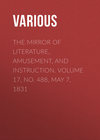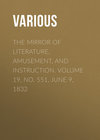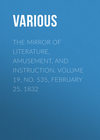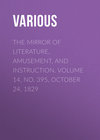Loe raamatut: «The Mirror of Literature, Amusement, and Instruction. Volume 17, No. 488, May 7, 1831», lehekülg 6
(To be continued.)
THE GATHERER
A snapper up of unconsidered trifles.
SHAKSPEARE.
PRISONS
We had formerly in the Tower of London, a straight room or dungeon, called, from the misery the unhappy occupiers of this very confined place endured, the Little-Ease. But this will appear a luxurious habitation, when compared with the inventions of Louis XI. of France, with his iron cages, in which persons of rank lay for whole years; or his oubliettes, dungeons made in the form of reversed cones, with concealed trap-doors, down which dropped the unhappy victims of the tyrant, brought there by Tristam L'Hermite, his companion and executioner in ordinary; sometimes their sides were plain, sometimes set with knives, or sharp-edged wheels; but in either cases they were complete oubliettes; the devoted were certain to fall into the land where all things are forgotten.—(Pennant's London.)
When the Bastille of France was demolished, three iron cages were discovered, they were made of strong bars of iron, about eight feet high and six feet wide, and such have been used in other prisons in that country. The Bishop of Verdun, according to Mezeray, was the inventer, and was himself the first man confined in them, and remained a prisoner thus for eleven years, so that he could speak practically as to his own invention.
FEMALE LEANDER
The Duchess of Chevereux, who was for the first time at the court of England, in 1638, swam across the Thames, in a frolic, near Windsor. On this occasion some verses were composed by a Sir J. M. containing these lines:—
But her chaste breast, cold as the cloyster'd nun,
Whose frost to chrystal might congeal the sun,
So glar'd the stream, that pilots, there afloat,
Thought they might safely land without a boat;
July had seen the Thames in ice involv'd,
Had it not been by her own beams dissolv'd.
BIRTHDAY PRAYER
The observance of a birthday by prayer is not altogether incurious in these days of license; and the following specimen, quoted from the Diary of that truly good man, JOHN EVELYN, may be entertained as the genuine effusion of piety, unmixed with any alloy of fanaticism, or religious enthusiasm:—
Oct. 31, 1689.—My birthday, being now 69 years old. Blessed Father who hast prolonged my years to this great age, and given me to see so great and wonderful revolutions, and preserved me amidst them to this moment, accept, I beseech thee, the continuance of my prayers and thankful acknowledgements, and grant me grace to be working out my salvation and redeeming the time, that thou mayest be glorified by me here, and my soul immortal saved, whenever thou shalt call for it to perpetuate thy praises to all eternity, in that heavenly kingdom where there are no more changes or vicissitudes, but rest and peace, and joy and consummate felicity for ever. Grant this, O Heavenly Father, for the sake of Jesus thine only Son and our Saviour. Amen.
CURIOUS LETTER,
From a country squire, in the 18th century, to a gentleman in London, who had written to him concerning the character of a Servant
"Sir—Yours I receiv'd the 24th of this present instant, June, and, at your request, will give you an impartial account of my man, John Gray's character. He is a shoemaker, or cordwainer, which you please to call it, by trade, and now in our town; he is following the carding business for every one that wants him; he served his time at a town called Binstock, in Northamptonshire; and from thence the Great Addington journeyman, to this occupation, as before mentioned, and used to come to my house, and found, by riding my horses to water, that he rode a horse pretty well; which was not at all mistaken, for he rides a horse well: and he looks after a kennel of hounds very well, and finds a hare very well: he hath no judgement in hunting a pack of hounds now, though he rides well, he don't with discretion, for he don't know how to make the most of a horse; but a very harey-starey fellow: will ride over a church if in his way, though he may prevent a leap by having a gap within ten yards of him; and if you are not in the field with himself, when you are hunting to tutor him about riding, he will kill all the horses you have in the stable in one month, for he hath killed downright, and lamed so that they will never be fit for use, no more than five horses since he has hunted my hounds, which is two years and upwards; he can talk no dog language to a hound; he hath no voice; speaks to a hound such as if his head were in a churn; nor neither does he know how to draw a hound when they are at a loss, no more than a child of seven years old. As to his honesty, I always found him honest till about a week ago. I sent my servant that I have now to fetch some sheep's feet from Mr. Stranjan, of Higham Ferrers, where Gray used to go for feet, and I always send my money by the man that brings the feet; and Stranjan told my man that I have now that I owed him money for feet; and when the man came home he told me, and I went to Stranjan, and then I found the truth of the matter. Gray had kept the money in his hands, and had never paid Stranjan: he had along with me once for a letter, in order for his character, to give him one, but I told him I could not give him a good one, so I would not write at all. Gray is a very great drunkard, can't keep a penny in his pocket: a sad notorious lyar. If you send him upon a mile or two from Uphingham, he will get drunk, stay all day, and never come home while the middle of the night, or such time as he knows his master is in bed. He can nor will not keep any secret; neither has he so much wit as other people, for the fellow is half a fool, for if you would have business done with expedition, if he once gets out of the town, or sight of you, shall see him no more, while the next morning he serves me so and so: you must expect the same if you hire him. I use you just as I would be used myself; it I desired a character of you of a servant, that I had design'd to hire of yours, as to let you know the truth of every thing about him.
"I am, sir, your most humble servant to command.
"Great Addington, June 28, 1734.
"P.S. He takes good care of his horses, with good looking after as to the dressing of them; but if you don't take care, he will fill the manger full of corn, so that he will clog the horses, and ruin the whole stable of horses."
EPITAPH
Upon two religious disputants who are interred within a few paces of each other
Suspended here, a contest see,
Of two whose creeds cou'd ne'er agree,
For whether they would preach or pray,
They'd do it in a different way;
And they wou'd fain our fate deny'd,
In quite a different manner dy'd!
Yet think not that their rancour's o'er,
No! for 'tis ten to one, and more,
Tho' quiet now as either lies,
But they've a wrangle when they rise.
LONGEVITY
In St. Michael's churchyard, at Litchfield, an ancient tombstone was lately discovered, which had been buried in the earth a great number of years. Upon it are deeply cut the following inscriptions:—
Here lyes the Body
of William Clarke,
who was Clarke of this
Church 51 years, and buried
March 25th, 1525, aged 96
Here lyes the Body
of William Clarke,
Clarke of this Church 71
years, who died Septem. 26,
1562, and aged 86
The father lived in the reigns of six different kings, viz. Henry the Sixth, Edwards the Fourth and Fifth, Richard the Third, and Henry the Seventh and Eighth. The son in seven reigns, viz. from Edward the Fourth to Mary the First.
Morning Chronicle, October 8, 1822
LINES
Written by a ragged Irishman, a passenger on board a vessel with the Archbishop of Tuam
If each man had his suum,
You would not have Tuam,
But I should get meum,
And sing a Te Deum.
G.K
MAY
The following verses were composed by John Barbour, a poet and divine, who was born at Aberdeen in 1330. They afford a specimen of the poetry in his time:—
"This was in midst of month of May,
When birdis sing on ilka spray,
Melland5 their notes, with seemly soun,
For softness of the sweet seasoun.
"And leavis of the branchis spreeds,
And blomis bright, beside them, breeds
And Fieldis strawed are with flow'rs
Well savouring of seir6 colours;
And all things wor this, blyth, and gay."
P.T.W
POPULAR SCIENCE
This Day is published, price 5s
ARCANA of SCIENCE, and ANNUAL REGISTER of the USEFUL ARTS for 1831
"This is the fourth annual volume of a most useful compilation of the various discoveries in science or inventions of art during the preceding year. The volume commences, very properly, with an abridgment of what may be termed the greatest work of art which has distinguished the present century—the Liverpool and Manchester Railway. Various other improvements in the different departments of the arts which have appeared in the several scientific journals of the last year, are here presented in a condensed form, so as to render the volume, in reality, an excellent book of reference. The object of the editor seems to have been that of blending entertainment with valuable information, the work being illustrated by many neat engravings relating to the popular branches of science. The volume, therefore, contains a very interesting compendium of information for young people."—New Monthly Magazine.
Printed for JOHN LIMBIRD, 143, Strand;—of whom may be had the Volumes for the three preceding years.




















